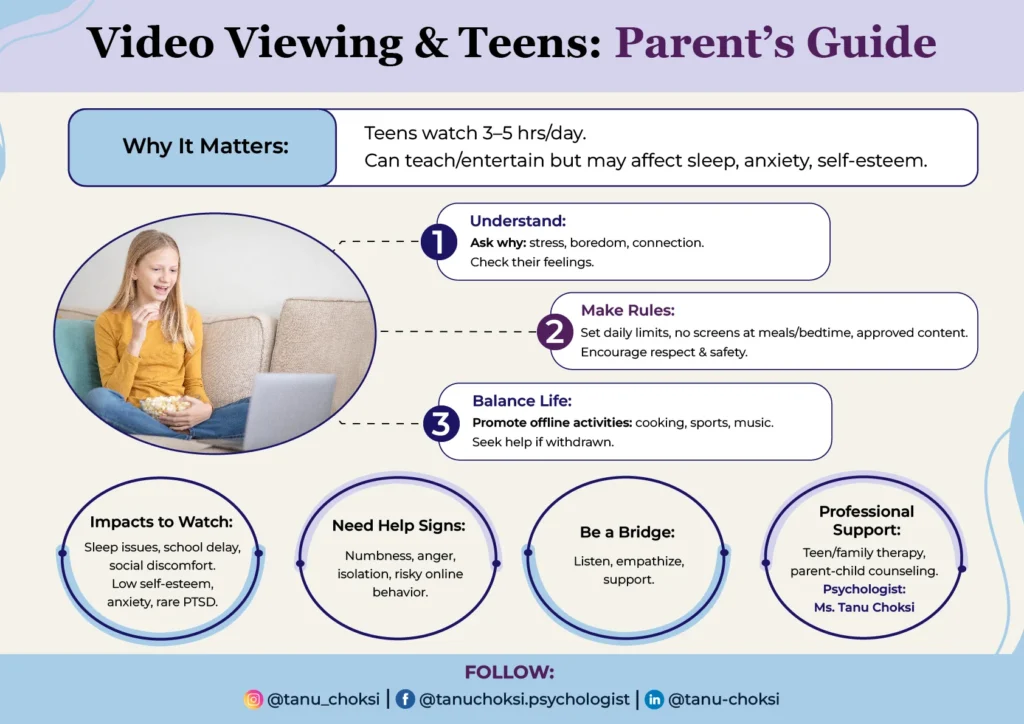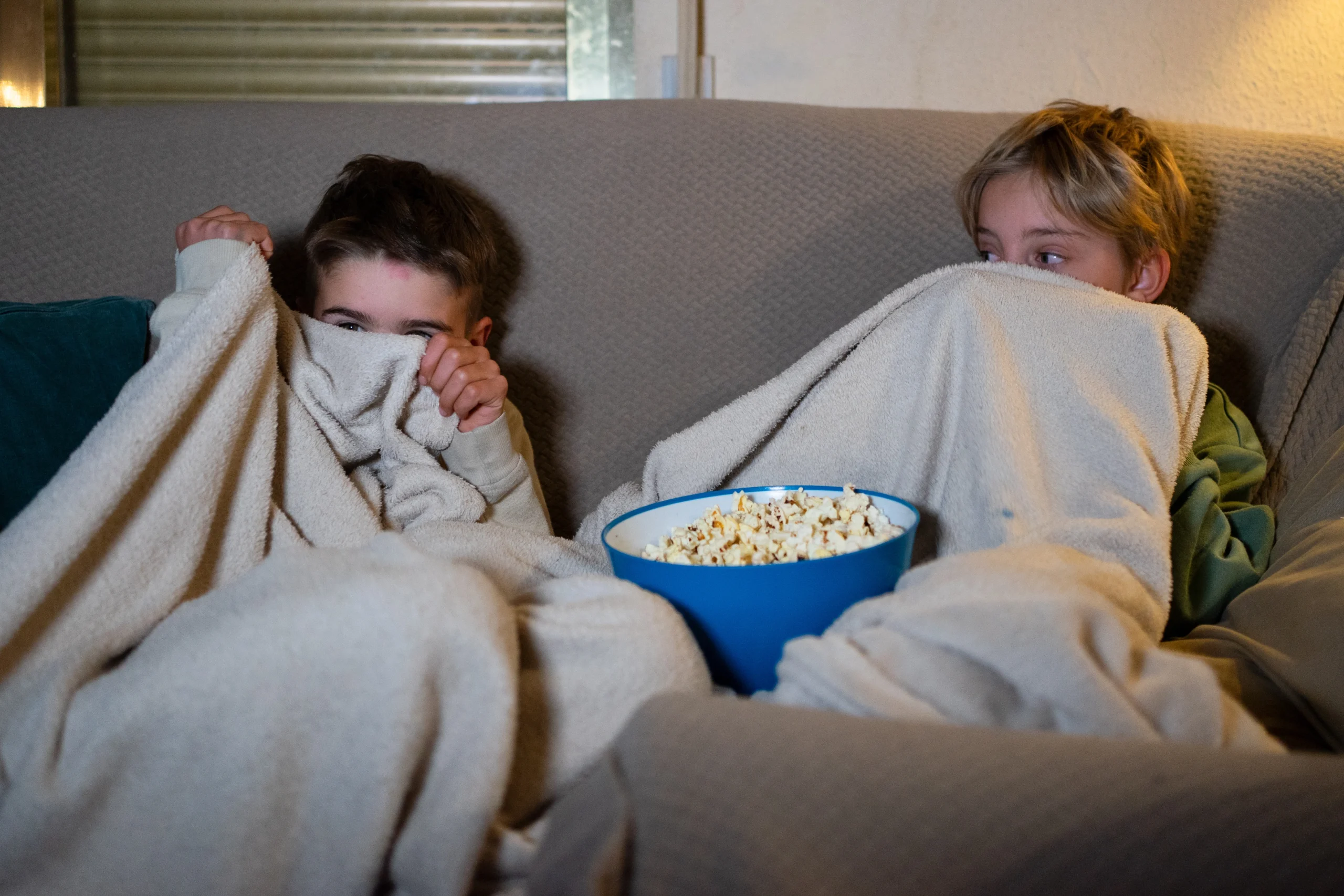As a therapist in Mumbai, I hear this a lot from parents: “My teen is always watching video-what should I do?” Teens use things like YouTube, Instagram Reels, or Netflix. Screen time are a big part of how they talk, learn, and feel good.
But is it right for parents to ask big questions? Is too much screen time bad? Should I set a limit to what they watch? Will they not be part of the real world?
I can tell you there is a better way. This is not about no screens at all. It is about making safe and good rules to help your teen’s mind and growth.
Why Video Use Matters for Teens Today:

The normal teen in India now spends near 3–5 hours a day on short or long videos, says a 2024 study from Kantar. That is more time than any group of people before them. It is not all bad. Videos can teach, be fun, and even empower. But with no rules, they can also:
- Fire up anxiety as they are too much for the mind.
- Leads to more sleep problems from late-night use.
- Create distorted body images or unrealistic expectations
- Make them feel bad when they look at peers or influencers.
As a psychologist in India, I have seen how too much video use can be a way to deal with deep problems. These can be feelings of being alone, school stress, or even undiagnosed depression.

1. Know Why Before You Act
First, ask: Why does my teenager watch so much? At times, videos are more than just for fun. They could be:
- A break from the stress of school.
- A way to feel “seen” by people they can relate to.
- A substitute for social interaction during a tough time
Do not just make rules right away. Make time for open talks where they do not feel judged.
Ask: “What do you like about these videos?” or “How do you feel after you watch them?” As a person who gives child counseling and teen therapy, I see that it is better to know your teen’s real emotional needs. It works more than just watching what they do.
2. Make Screen Rules With Them
Let’s be clear—rules do not often work if only one person makes them. Teens like to have a say in their own lives. This is a good thing. Do not just say “No screens after 8.” Ask them to help make the family’s screen rules.
Try to make a “screen deal” with them. It can have:
- A screen time limit each day for things that are not schoolenable.
- No screens at meals or at sleep time.
- A list of good things to watch (for school, for their age, or for fun).
As a family therapist, I have helped many homes in India go from fighting to working as a team. The aim is not just to have discipline. It is mutual respect and emotional safety.
3. Mix screen time and real life.
Homes with high video use may miss other good things for the heart. Teens watch videos not just for fun. They watch them when they are bored, have anxiety, or feel like no one has seen them. As a parent, you can bring some balance.
- Find things to do with them (cook, play music, or play games).
- Get them to play outside or do sports.
- Show you see how they feel. Say, “You look like you have a lot on you.” Want to talk?
When necessary, do not wait to get help from a pro. I give online psychologist consultations in India to teens. I can help if they show signs of pulling away, being cross, or having low motivation, most of all after days with a lot of screen time.
What You Do Not See: Sleep, School, and How They Feel
Too much video can lead to:
- Bad sleep (The blue light from the screen stops good sleep).
- Putting off school work (most of all watching many shows at one time).
- Not being sure how to act with people (it can feel safer to watch life than to live it).
Parents come to me and think it is just a “focus problem.” But when I check their kids in individual therapy, I find bigger problems. These can be low self-esteem, a fear of not doing well, or even early signs of chronic post-traumatic stress disorder symptoms (this is rare but can be very bad).
Signs Your Teen May Need Help
Here is when watching videos may show a big problem:
- They show no feelings or get mad very fast.
- The grades are going down or they do not like their old hobbies.
- They stay alone a lot or do not want to talk.
- They copy bad things they see on the web.
If you see this, it may help to talk to a certified cognitive and behavioral therapist in Mumbai. Or you could start anxiety management programs in Mumbai to help them deal with their feelings.
Last words: Be a bridge, not a wall.
Your teen needs more than rules. They need you. They need you to be calm, ask questions, and be there for them. Videos are here to stay. Understanding teen behavior is crucial because it allows parents to address the underlying issues that may be driving excessive screen time. When parents take the time to listen and empathize with their teens, they can create an open environment where teens feel comfortable expressing their emotions and concerns.
This understanding can lead to healthier coping mechanisms and better relationships, as teens learn to navigate their challenges with support rather than isolation. The real job is to learn how to lead them. Do this with no shame or bad feelings. Do not make them want to fight back.
As a licensed psychologist in India, I tell all parents I work with this: You are not in a war against screens. You are making a bond that is strong enough for any storm.
If you need help making rules that give both love and safety, I can help with:
- Group therapy sessions in Mumbai for teens and families.
- Relationship counselling in India helps parents and kids talk.
- Premarital counseling services in Mumbai if you are also a team of two parents.
Practo Profile Line
Ms. Tanu Choksi is a kind and warm helper and therapist in Mumbai. She gives good ways to fix personal problems. She listens and does not judge you.
Social media and channel promotion.
Follow us on Instagram, Facebook, and LinkedIn for more tips, tools, and help on teen mental health.




